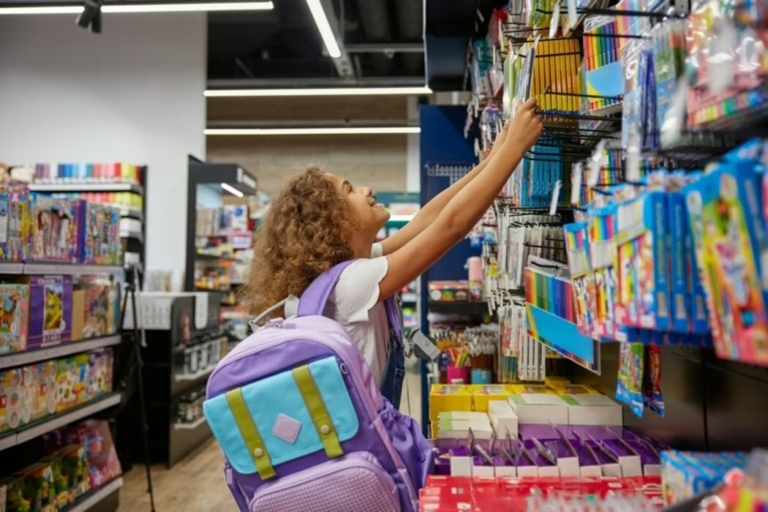As the new academic session draws near across Nigeria, parents and guardians are once again faced with the growing financial demands of preparing their children for school. From purchasing textbooks and uniforms to stationery and school fees, the costs can quickly add up.
In response to this seasonal rush, many entrepreneurs are tapping into the back-to-school market, turning it into a thriving business opportunity. By focusing on the right products, timing their sales strategically, and using effective promotional techniques, sellers are successfully meeting the surge in demand and carving out a profitable niche in this area.
A mother of two, Mrs Ojo Tolulope, shared her reasons for buying school supplies early. It was the price that made me buy it. The price is cheap, and I wanted to get it before prices go up since school will be starting soon. I like things that are both affordable and high-quality,” she explained.
Tolulope also noted that, the set she bought is handmade, unlike many mass-produced options in the market. To her, “the lunchbox and School bag i bought last year for my children cost over N20,000. But I got this handmade set early for only N12,500 for both the bag and the lunchbox. If I had gone to a store, it would have cost N25,000.”
Another mother shared her experience of purchasing a lunch box for her daughter for N5,000 in preparation for school. “I chose it because it is durable and keeps food warm for a long time. The one I bought before was N8,000, but it fell apart. The zipper and stitching broke, and it couldn’t be fixed,” she said.
Mama Rachel, who makes these items herself, explained why hers stand out. “The schoolbag and lunchbox go for N7,500. N4,000 for the bag and N3,500 for the lunchbox. The people who buy from me and resell also make good money. Some also make profits as much as N7,500,” she noted.
Speaking about where she sources materials, she said: ‘I get materials from Mushin, and I use leather because it is durable. It lasts longer and is not like the ready-made items you see around. I only choose leather designed specifically for bags, so it doesn’t cut or wear out easily. This period is when we get most orders because schools are resuming soon.’”
Another businesswoman who deals in back-to-school items, Mrs Tokede Damilola, spoke about why customers patronise her business. “The items are of good quality, durable, and highly appreciated by customers. People really love these products because they last a long time, and that is why I specifically seek UK items,” she said.
Profitability
On the profitability of the business, Damilola added that, many people overlook this kind of trade, assuming it requires a large capital to start, adding that, “But if you buy in bales from the right suppliers, you can enjoy good profits. It’s important to buy from trusted firms, not random vendors who sell any used items. When you buy from the correct firm, you are assured of quality.”
She explained how she handles her stock: “When I open a bale, I look for items that are very nice. Most of the school-related products, including school bags, are Grade 1. This means they may have been used before but are in excellent condition. Sometimes even new. For example, in the last bale I opened, we found several neat laptop bags that were still unused. I focus only on Grade 1 items, not clearance stock.”
Damilola sources her bales from Arena Market through a trustworthy vendor. The market is very good, and he always provides what I need, she said.
She highlighted that, the peak business period is just before schools resume. “Many parents with multiple children start buying early to avoid the price hikes that come closer to the school resumption date.
Prices tend to rise during this high-demand period, so people prefer to buy early,” she noted.
Discussing pricing and profit margins, she said: “It depends on the contents and quantity inside each bale. For example, a bale may cost around N430,000, but the exact value depends on the variety of bags and items included. A typical school bag in my area sells for about N10,000, whereas in Arena Market, similar bags might go for N15,000 because of location differences. Children’s clippers sell for about N3,000 here compared to N4,000 at the arena.”
From one bale, Damilola can make between N50,000 and N200,000 profit, depending on quality and quantity. “When the quality is top-notch and items are properly sourced, sales are fast and profits are good.”
Tips Of Survival
For those interested in starting this business, she advised buying bales from reliable suppliers. “You don’t necessarily need formal training, just the right guidance. I learnt from someone who introduced me to a trustworthy vendor. My first purchase was a bale worth about N1.3 million, which included children’s bags, shoes, and lunch boxes. This initial investment was worthwhile; I have no regrets after opening those bales,” she said.
Her advice to new entrants is simple but crucial: “Be patient and smart. Don’t rush into buying from unreliable sources because once you open a bale, you cannot return it. Always verify the grade and quality before buying. Being bold and strategic when pricing is essential. As you sell, pay close attention to which items attract the most interest and price accordingly to maximise your profit.

















